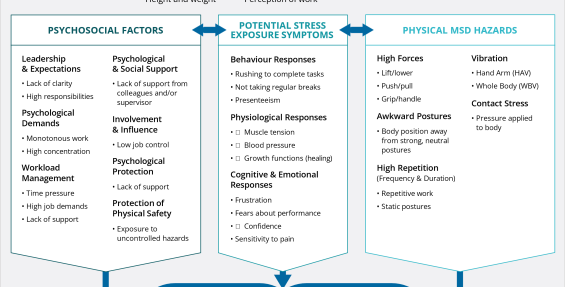What are Psychosocial Factors?
The word “psychosocial” is often used when talking about causes of MSD. It is useful to separate “workplace psychosocial” factors from “individual psychosocial” factors.
- Workplace psychosocial factors refer to the perceptions of the work environment that have an emotional meaning for workers and managers. Examples include high workload or lack of control.
- Individual psychosocial factors refer to individual characteristics, such as psychological distress.
Workplace Considerations
The work organization determines to a large extent the type and degree of psychosocial work factors experienced by workers. Different work organizations will create different psychosocial workplace factors. Electronic performance monitoring is an example of a work organizational factor that leads to negative psychosocial work factors. Workplace psychosocial factors are important for workers’ health in general, mental health, as well as MSD.
With this in mind, multiple studies show a consistent pattern of workplace psychosocial factors that are also MSD hazards. Psychosocial factors include a mix of jobs, work environments and organizational characteristics. They include factors such as low job control, low decision latitude, conflicting job demands, or low supervisor support. On the positive side, these hazards are generated by the organization and therefore can be changed by the organization.
Evaluating Psychosocial Factors in the Workplace
Physical & Psychosocial Risk Assessment Tools
- JCQ1 & JCQ2: Job Content Questionnaires – request for permission to use
- NASA Task Load Index (Paper & pencil version or iOS application)
- APHIRM: A Participative Hazard Identification and Risk Management Toolkit
Requiring purchase:
- WOAQ: Work Organisation Assessment Questionnaire (publication: https://doi.org/10.1136/oem.2005.023671)
Psychosocial Risk Assessment Tools
- COPSOQ: Copenhagen Psychosocial Questionnaire
- Effort-Reward Imbalance Questionnaire (Long and short version)
- HSE Stress Indicator Tool
- JDSCQ: Job Demand Support Control Questionnaire
Requiring purchase:
- PSC-12: Psychosocial Safety Climate Scale (PSC-12 available in appendix of publication: https://doi.org/10.1037/a0021320)
- NSS: Nursing Stress Scale (survey items listed in publications)
Relevant CRE-MSD Resources

Psychosocial Factors, MSD, and Mental Health Poster
Workplace psychosocial factors are cultural, social and psychological factors determined at or by the workplace that impact employees’ responses to work and their work environment, which can result in negative mental health outcomes and increase the risk of MSD.
Psychosocial Factors Position Paper
This CRE-MSD position paper titled 'Musculoskeletal Disorders and Mental Health: The Role of Psychosocial Factors in Optimizing Prevention' written by Dr. Heather Johnston, discusses what psychosocial factors are, and how they can be assessed in relation to MSD.

Want to search the resource library?
Find all the available resources on the MSD prevention website, including posters, videos, and links to relevant websites.

